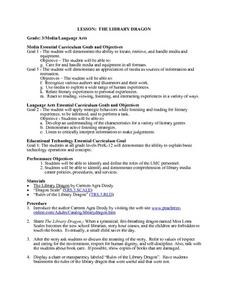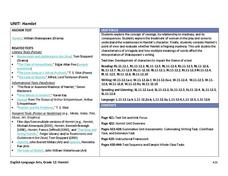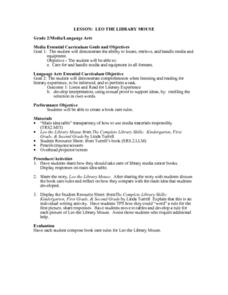National Council of Teachers of English
Writing Acrostic Poems with Thematically Related Texts in the Content Areas
Scholars scour thematically aligned texts to gather a bank of words they can use in an original acrostic poem.
Free Library of Philadelphia
Resources for Ghost Boys
Jewell Parker Rhodes, the author of Ghost Boys, wanted to bring the historical legacy of Emmett Till and the current topic of racial prejudice into today's young readers' mindsets. Use a reading guide and set of discussion questions to...
EngageNY
Researching Digital Sources, Part 1: Guided WebQuest
We are living in a technical world. Scholars learn how to examine digital resources for their research on DDT. They explore a list of websites using a Digital Resources on DDT sheet. Learners examine their research notebook to determine...
Curated OER
The Library Dragon
Third graders examine the role of the library media specialist in the school by listening to a read aloud of The Library Dragon and visiting Carmen Agra Deedy's website. They talk about respect for the books and the others using the...
University of Pennsylvania
Using Comic Strips to Teach Multiple Perspectives
Scholars view comics from two different perspectives; one paints the Alfred Dreyfus as innocent, while the other portrays the exact opposite. They solve the mystery of what happened by analyzing the source, working in groups, and...
Teaching Tolerance
In Our Own Words: A Story Book with a Purpose
Academics turn into storytellers in an engaging activity on activism. The activity focuses on promoting social change in local communities with stories. Young historians plan a storybook to target a specific audience and social issue and...
ReadWriteThink
Dear Librarian: Writing a Persuasive Letter
Everyone deserves to read a great book! Here, pupils write a persuasive letter to the school's librarian detailing their favorite story and why it should be found on the shelves. Class members' persuasive reading passages are shared with...
Curated OER
Finding Your Way Using QR Codes
If you are taking your class on a library tour, use this scavenger hunt activity to spice it up. Although this hunt isn't actually attached (like the lesson says it is), you will get a good idea of how to implement a task like this....
Curated OER
Animals Should Definitely Not Borrow Library Books
First graders practice borrowing library books. For this library lesson, 1st graders discuss what would happen if animals could borrow library books. They visit a website where they watch what would happen. They discuss how to care...
Curated OER
Library Scavenger Hunt
Students work together to locate and identify resources in the library. They use the internet to answer research questions. They share the information they gathered with the class.
Louisiana Department of Education
Unit: Hamlet
Encourage readers to determine if Hamlet's madness is actually divinest sense. Class members analyze the words of the play before studying related texts, including T.S. Eliot's "The Love Song of J. Alfred Prufrock," scenes from...
Curated OER
The Minerva Mosaic of the Library of Congress: Taking a Closer Look
Students interpret historical evidence presented in primary resources. In this symbolism lesson, students examine the Minerva Mosaic of the Library of Congress. Students consider the symbolism of the mosaic.
Curated OER
Exploring the Library
Pupils explore ways to use the library as a resource for accessing research material. Working individually, they participate in a teacher created library scavenger hunt to aid in locating fiction and nonfiction material as well as...
Curated OER
Leo the Library Mouse
Second graders share how they should take care of library media center books and display their ideas for others to see. They read the book, LEO THE LIBARY MOUSE and discuss book care rules and reflect on how they compare with the main...
Curated OER
Library Orientation with Mythology Emphasis
Learners investigate their library's layout and complete a research project for mythology. In this mythology research instructional activity, students participate in an orientation to their school library's layout and investigate...
Curated OER
Orientation to the Library
Students participate in an orientation to the high school library and locate various resources. In this orientation to the library lesson, students are introduced to the library by the media specialist. They learn the layout and...
Curated OER
Using Information Resources: Lesson 4
Fourth graders review a variety of information resources and identify parts of a book. They practice brainstorming and practice skimming. They review all the research resources that are found in the library.
Curated OER
The Designed World
Young scholars visit a school or public library and study how information is organized. In this information management lesson, students answer a group of questions about the organizational method of the library. Young scholars then...
Curated OER
Through Many Lenses: How are Countries Depicted by the Media?
If you plan to utilize the ABC miniseries, "The Path to 9/11" in your classroom, consider incorporating media literacy and research skills. After (or while) learners view the series, they discuss ways information can differ from source...
University of Wisconsin
BEAM: Background, Exhibit, Argument, Method
Thinking of assigning a research paper? Get writers off on the right foot with a lesson that introduces the BEAM research model. Writers brainstorm the background of their topic, explicate the aspects of their topic, consider the...
Library of Congress
Determining Point of View: Paul Revere and the Boston Massacre
If you're teaching point of view, this is the lesson for you! First, decipher the writer's point of view from a primary resource, then compare and contrast the primary source with a secondary source to explore the Paul Revere's engraving...
Southern Nevada Regional Professional Development Program
Close Reading in the Classroom
Close reading is key to the analysis and interpretation of literature. A close reading of the title and the epigraph of “The Love Song of J. Alfred Prufrock” offers readers an opportunity to examine how even single words or names can...
Poetry Class
Writing a Monologue
The works of Carol Ann Duffy, Scottish poet and Britain's 2009 poet laureate, serve as a model for a writing activity that asks class members to select a character card, brainstorm lists of words, phrases, actions, and items associated...
EngageNY
TASC Transition Curriculum: Workshop 9
Here's a workshop for teachers that rocks the academic world! Using earthquakes as a medium for instruction, educators learn about crosscutting engineering with science. Fun, hands-on, collaborative exercises encourage participants to...

























